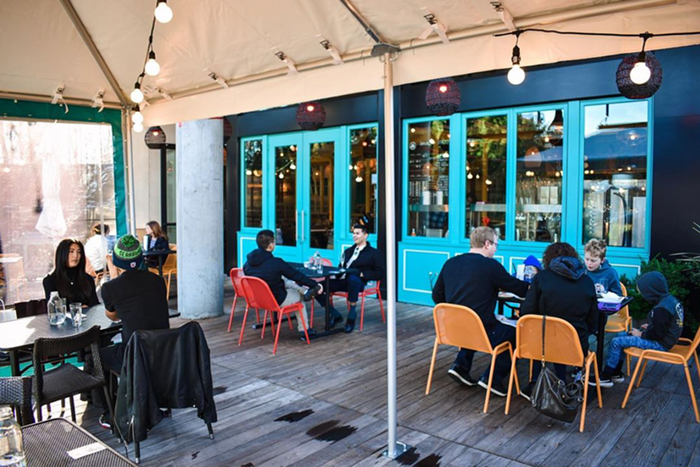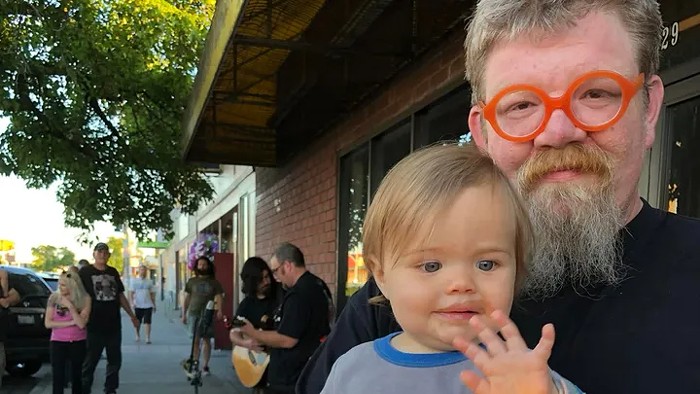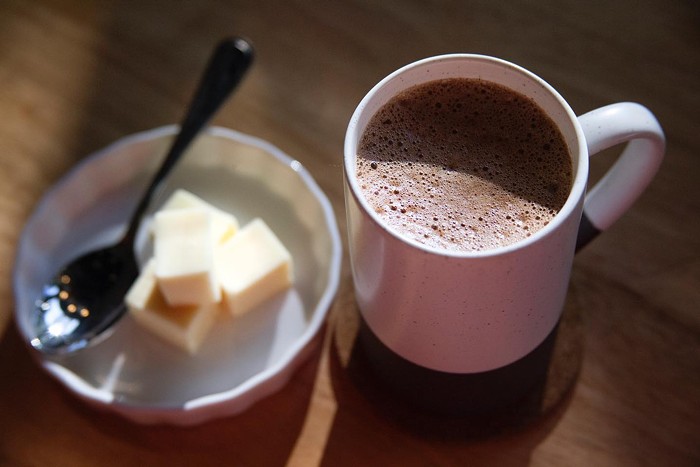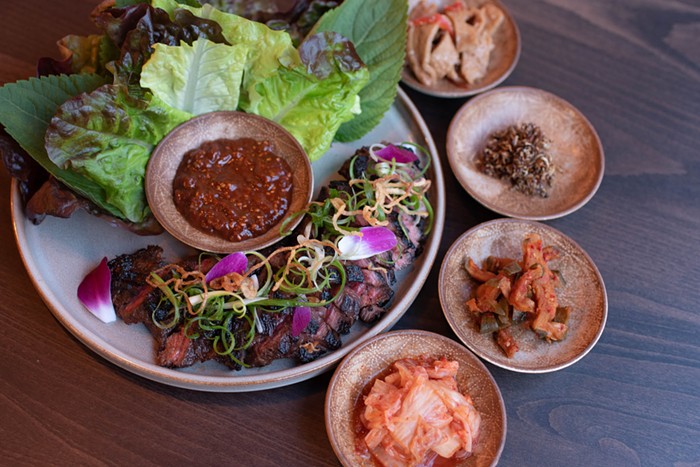Gabriel Claycamp hovers over a 12-burner gas range as a pan full of his homemade bacon pops and sizzles away. Around him, in what once served as the kitchen of Culinary Communion cooking school, are stacks of boxes filled with 400 pounds of pork belly.
Surrounded by meat, Claycamp looks like he was sent from central casting. He's burly in the way that chefs tend to be from spending their days cleaving through meat and bone and hefting large steam trays around hot kitchens; he has tattoos running up the insides of his forearms and a messy mop of hair.
At the end of the month, Claycamp, his wife, and their three children will move out of their big purple house on Beacon Hill. It's been their home as well as the home of Culinary Communion, the Swinery, and Lunch Counter, and it's been the source of a great deal of controversy over the last year. After a string of issues with the health department, the liquor control board, and the landlord, combined with the business- crushing economy, Claycamp is getting ready to close up shop. He's curing his final batch of Swinery bacon, which he will sell through the end of the month to try to pay off debts associated with the school. What happens after that remains unclear.
"I don't know if we'll be back," Claycamp says with the melancholy look of a child cradling the pieces of a broken toy. And even if he does come back, he'll have little to come back to—slowly but surely, he's dismantling Culinary Communion's kitchen piece by piece. Last week, he sold 65 jars of spices, which await their new owner on a shelf. Now he's reluctantly negotiating the sale of the gas stove. "If this is a big hole," he says, pointing to where the big black range sits in the center of the kitchen, "my heart is broken. It's just a stove, but it's the stove."
As Claycamp's would-be culinary empire—the cooking school, the short-lived restaurant Lunch Counter, the bacon-making side project that wasn't even properly permitted until earlier this month—crumbles around him, it's clear he's had time to think about where everything went wrong.
Claycamp grew up on his mom's home cooking and sold cutlery when he was 17. "I was going to be a marine biologist," he laughs. Instead, he trained at the Culinary Institute of America Hyde Park, graduating in 1999. After finishing school, he lived on friends' floors and worked kitchen jobs in New York until he got tired of working the line and moved to Seattle.
In 2001, he opened Culinary Communion out of a two-bedroom apartment in Redmond, later moving his classes to Queen Anne. Claycamp's vision for the Communion kept getting grander. After finding a house on Beacon Hill, he spent about $200,000 renovating and upgrading the building and opened what he called Culinary Communion House.
Then a year ago, in the middle of a cooking class, a Washington State Liquor Control Board (WSLCB) agent knocked on the front door and ordered Claycamp to cease and desist serving wine during cooking classes and conducting any cooking involving booze. In Washington, cooking schools can use alcohol and serve it to class attendees. However, according to WSLCB spokesman Brian Smith, Claycamp was serving alcohol to people who were not in his classes.
This wasn't by any means the first time Claycamp had played the part of the food rogue. Months earlier, he'd gotten on the wrong side of the health department for a not-as-secret-as-it-should-have-been "underground" restaurant, Gypsy. He got involved, he says, after he was "drafted" by friends following a lengthy discussion of the underground- restaurant trend at his wife's birthday party. But Gypsy, he says, wasn't started out of rebelliousness. "It was out of expediency and brokeness," he says. "Gypsy didn't start to avoid [health and liquor] codes. Gypsy started because it was fun." His philosophy: "Health-department rules are critical for people who don't know what the fuck they're doing. We're chefs."
After star chef Anthony Bourdain was invited to dinner with his camera crew, Gypsy's hubris was rewarded with yet more attention from the health department, which was already hot on the trail. With the plug about to be pulled, Gypsy preemptively shut itself down, sending a wounded, righteous e-mail to document the fact.
Claycamp started the Swinery and began making bacon earlier this year—with the hopes of selling it at farmers markets to help make rent—because, he says, "I was pissed off no one in Seattle made good bacon." What he didn't do was clear his new business with the health department. In December, a health inspector showed up to an address in Bothell that Claycamp had provided as that of the bacon-making operation, only to find that Claycamp was not in fact renting space at the facility. Then last month, he started selling product to brand-new sandwich shop Homegrown in Fremont. It turns out that USDA restrictions prohibit sale of cured meats without special certification—which Claycamp, predictably, did not have—so Homegrown pulled the illegal meat.
Currently, Claycamp has been cleared to make and sell bacon out of Culinary Communion's kitchen, but he is still unable to sell it wholesale to restaurants. Meanwhile, he opened up Lunch Counter, a lunch-only restaurant at Culinary Communion House, in mid-March. It lasted about a month.
For all of the trouble it's caused him, Claycamp still seems to get satisfaction out of being a renegade. "I've been tagged by Homeland Security as an international cheese terrorist," he says with pride.
After gaining infamy in the Seattle food scene, Claycamp isn't quite sure where he'll go. He has applied for one job out of state, but he says leaving Seattle would be "an admission of defeat." So far, he hasn't even figured out where he and his family will be living when May rolls around. Right now, they're eating leftovers from Culinary Communion classes—where attendance plummeted 90 percent in the last year—and trying to find a way to pay back those who signed up for classes that are never going to take place. Amid the chaos, finding a new location for Culinary Communion has been put on the back burner.
As Claycamp stands in the center of his kitchen, surrounded by the carcasses of Culinary Communion and several dozen hogs, he seems calm. Everything that could have possibly gone wrong has. Still, he remains unfazed.
"This is all personality drama," he says. "It's not about the bacon." ![]()



















